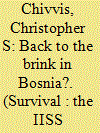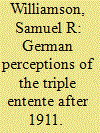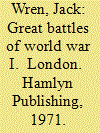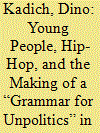|
|
|
Sort Order |
|
|
|
Items / Page
|
|
|
|
|
|
|
| Srl | Item |
| 1 |
ID:
095996


|
|
|
|
|
| Publication |
2010.
|
| Summary/Abstract |
Today in Sarajevo there is disturbing talk of an unravelling of the Dayton Accords that ended the bloody civil war there 14 years ago. Nearly 100,000 people were killed in that war, which pitted Muslims against Serbs against Croats, and saw Europe's nastiest massacres since the Second World War. Since 1995, Bosnia has been at peace, but the main political parties continue to fight over the basic issues that started the war almost two decades ago. Concern over the general political situation has increased as nationalist rhetoric has raised the spectre of a re-division of the country and an ensuing descent into violence. Some in Sarajevo even evoke the possibility of 'European Gazas' emerging in some parts of the county, where there are hints that unemployed Muslim youth may be coming under the influence of a radical, foreign brand of Wahhabist Islam.
|
|
|
|
|
|
|
|
|
|
|
|
|
|
|
|
| 2 |
ID:
103943


|
|
|
|
|
| Publication |
2011.
|
| Summary/Abstract |
After 1911, Germany felt increasingly threatened by the Triple Entente. Secret intelligence from the Russian embassy in London revealed a growing cohesion among the Triple Entente partners: Britain, Russia, and France. In particular, Berlin feared the success of Raymond Poincaré of France, first as premier and then later as President, as he worked to convert the entente with London into an alliance and to reinforce alliance ties with Russia. In the summer of 1914 came the murders at Sarajevo of Habsburg Archduke Franz Ferdinand and his wife. When Vienna decided to punish Serbia, Berlin agreed to support them in the belief that Russia would not back Serbia. But even if Russia did support Serbia, better a war now than later. Rather than be intimidated, Russia took escalatory actions of its own to help Serbia and their French ally. The First World War was the result.
|
|
|
|
|
|
|
|
|
|
|
|
|
|
|
|
| 3 |
ID:
025679


|
|
|
|
|
| Publication |
London, Hamlyn Publishing, 1971.
|
| Description |
434p.Hbk
|
| Standard Number |
0600339033
|
|
|
|
|
|
|
|
|
|
|
|
Copies: C:1/I:0,R:0,Q:0
Circulation
| Accession# | Call# | Current Location | Status | Policy | Location |
| 011105 | 940.41/WRE 011105 | Main | On Shelf | General | |
|
|
|
|
| 4 |
ID:
181315


|
|
|
|
|
| Summary/Abstract |
This article investigates youth political subjectivity and subject formation in the context of postsocialist transition and projects of post-conflict peace-building in Sarajevo, Bosnia and Herzegovina. Following a youth subculture, it explores how nationalist visions of the future, the geopolitics of partition, and the very notion of ethnic identification itself are unwound and contested through embodied, affective geopolitical engagements in a hip-hop public. Drawing on feminist political geography, the article argues for scholarly understandings of young people’s lives as constituted by and constituting everyday geopolitical realities. In doing so, it calls for scholarly attention to the ways in which youth, in the course of turning away from dominant institutions, practice illegible forms of politics. To that end, the article tracks how these young people used hip-hop to cultivate a “grammar for unpolitics” centred around the urban as an ethics and category of belonging that fostered forms of mutuality radically alter to dominant notions of identity. These unpolitical engagements, the article argues, appropriate and subvert larger political discourses such as violence and victimhood, creating spaces for politics outside of the ethno-national problematic.
|
|
|
|
|
|
|
|
|
|
|
|
|
|
|
|
|
|
|
|
|